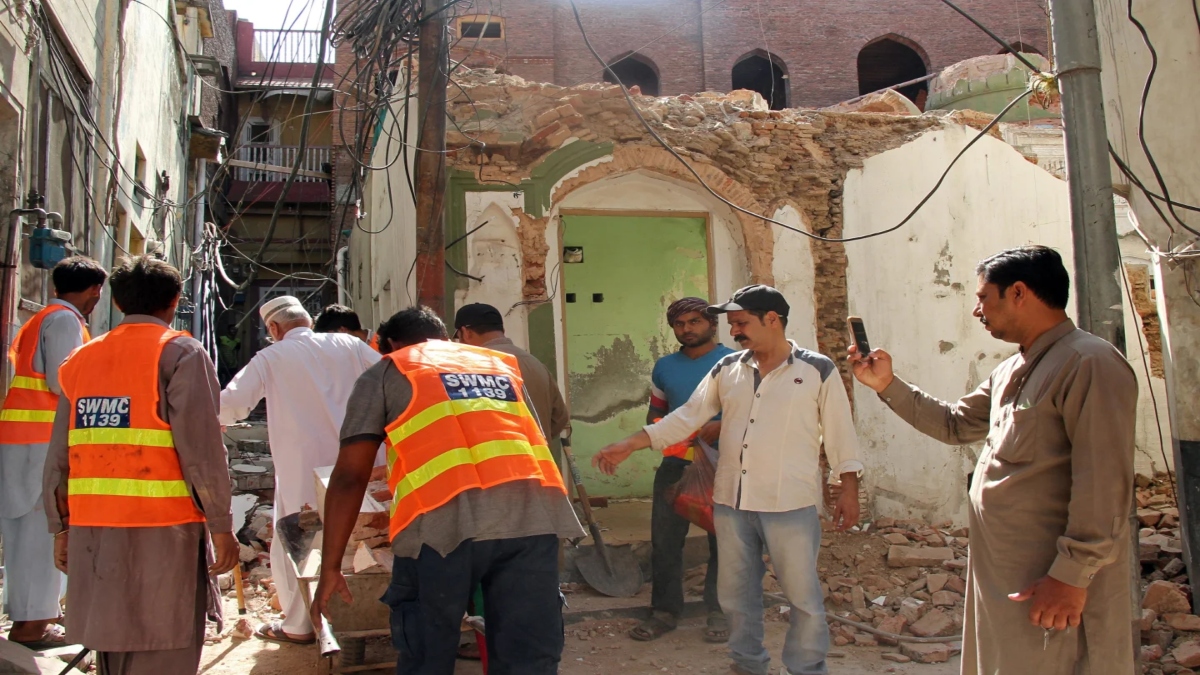Multiple people belonging to the Ahmadiyya community were detained by the police and were accused of violating the Constitution in Pakistan’s Gujranwala City. In the span of a few days, several people from the minority community were arrested for sacrificing a goat on Eidul Azha.
Part of the reason for this arrest was the fact that the Constitution of Pakistan does not consider Ahmediyya as part of the Muslim community. Earlier this week, a person from the Minority group was booked in Toba Tek Singh district, at the complaint of an official of Tehreek-i-Labbaik Pakistan (TLP), for sacrificing a goat on Eid.
Five similar cases were also registered across Punjab (Pakistan) last year, not only this, two members of the community were shot dead in Mandi Bahauddin earlier this month.
The cases were filed under Section 298-C of the Pakistan Penal Code (PPC). The aforementioned section deals with the penalty for a person of the Ahmadiyya group calling themselves a Muslim or preaching or propagating their faith. But what’s the reason behind Pakistan’s disdain for Ahmediyyas?
Who are Ahmadiyya?
The Ahmadiyyas believe that the Messiah Ghulam Ahmad lived after Islam’s prophet Muhammad and insist that they are part of Islam. The minority group was declared as non-Muslim in Pakistan in 1974 by former PM Zulfiqar Ali Bhutto.
Since then, the group has been facing both legal and social discrimination in the Islamic country, and the attacks on their properties have increased manifold in the past decade. It is pertinent to note that the Islamization of Pakistan, which political analysts say started during former Prime Minister Zulfiqar Ali Bhutto’s government in the 1970s, went on to culminate in the 1980s under the former military dictator General Zia ul-Haq’s draconian regime.
Impact Shorts
More ShortsIt was during Haq’s era that the Ahmadis were banned from calling themselves Muslims. They were also barred from opening mosques in the country and their existing places of worship were brutally shut down or desecrated by hard-line Islamists with the support of the state.
According to Pakistan’s National Commission for Human Rights, more than 280 Ahmadis were killed in targeted violence from 1984 to September 2023. Another 415 faced assaults, 51 Ahmadia worship places were damaged, 39 were set on fire and 18 were forcibly occupied besides 46 others that were sealed by the authorities.
What does the Constitution say? The finality of prophethood
When Pakistan’s then-Prime Minister Bhutto shifted to hardline Islamist ideologies, he outrightly declared that Ahmedis were not Muslim since they didn’t believe in the finality of the prophet Mohammad.
On September 7 1974, Pakistan’s Parliament passed the Second Amendment to the Constitution, defining the followers of Mirza Ghulam Ahmad, as non-Muslims. This brought two changes in the constitution:
Article 106, Clause 3 was amended to include persons of Qadiani or Lahori group, both of whom call themselves Ahmadis, in the list of religious minority communities. This means that they will no longer be considered Muslims.
Article 260 of the Constitution defines who a Muslim is and emphasises the finality of the prophet Mohammad. The amended version of the article read:
“A person who does not believe in the absolute and unqualified finality of the Prophethood of Muhammad (Peace be upon him), the last of the Prophets, or claims to be a prophet, in any sense of the word or of any description whatsoever, after Muhammad (Peace be upon him), or recognizes such a claimant as a prophet or religious reformer, is not a Muslim for the purposes of the Constitution or law”.
But are the Ahmedis really violating the constitution?
While the PPC bars, the Ahmadiyya group from calling themselves Muslim or preaching or propagating their faith, a 2022 Supreme Court judgement ruled that obstructing non-Muslims from practising their religion within the confines of their place of worship was against the Constitution as well.
“To deprive a non-Muslim (minority) of our country of holding his religious beliefs, to obstruct him from professing and practising his religion within the four walls of his place of worship is against the grain of our democratic Constitution and repugnant to the spirit and character of our Islamic Republic,” a nine-page judgment, authored by Justice Syed Mansoor Ali Shah, stated at that time, Dawn reported.
While in these particular cases, the group was asked not to perform rituals similar to Muslims, the constitution still protects the group from practising their religion, even if they are deemed as Muslims.
With inputs from agencies.
)